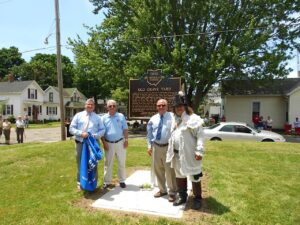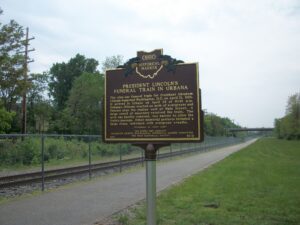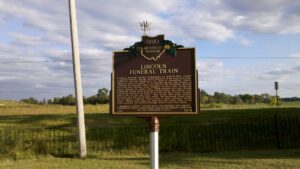, OH
In 1805, a burial ground was dedicated to Champaign County at the intersection of Ward and Kenton Streets, which was then at Urbana’s town limits. It remained open until 1856. Among those interred there was Elizabeth Kenton, eight-year-old daughter of Simon Kenton. When she died in 1810, Kenton, the county jailer, was forbidden from crossing out of the town limits due to his unpaid debts. After following the funeral procession as far as he could, he watched Elizabeth’s burial from across the street. Also buried there were unknown soldiers from the War of 1812; Captain Arthur Thomas and son, who were killed by Native Americans in August 1813; four Bell children, who died in the tornado of March 22, 1830; and numerous early settlers of Champaign County. Many, but not all, were reinterred and rest in Oak Dale Cemetery.
, OH
The nine-car funeral train for President Abraham Lincoln departed Washington, D.C. on April 21, 1865. It arrived in Urbana on April 29 at 10:40 p.m. Urbana’s citizens erected an arch of evergreens and flowers near the station west of Main Street. A large crowd of mourners received the train. The arch was hastily removed, too narrow to allow the train’s passage. Other memorial gestures included a large cross, entwined with evergreen wreaths.
, OH
President Abraham Lincoln’s assassination on April 14, 1865, created a national tragedy, and the nation mourned as his body was transported by rail from Washington, D.C. back to Springfield, Illinois, where he would be buried. On its way the Funeral Train stopped in Columbus and Lincoln’s coffin was moved to the Statehouse Rotunda for a day-long viewing. From Columbus Governor John Brough and others changed the train’s route, which resulted in a trip through Champaign County where it stopped several times. The Funeral Train arrived in Woodstock on April 29 at 9:46 p.m. for a brief ceremony and to take on fuel and water. With nearly 500 people present, bouquets were laid on Lincoln’s coffin. The Woodstock Cornet Band, led by Warren U. Cushman, played hymns of grief, including “Pleyel’s Hymn.” Village bells rung and silent men and women stood as the train departed and traveled downhill toward Cable and Urbana.




